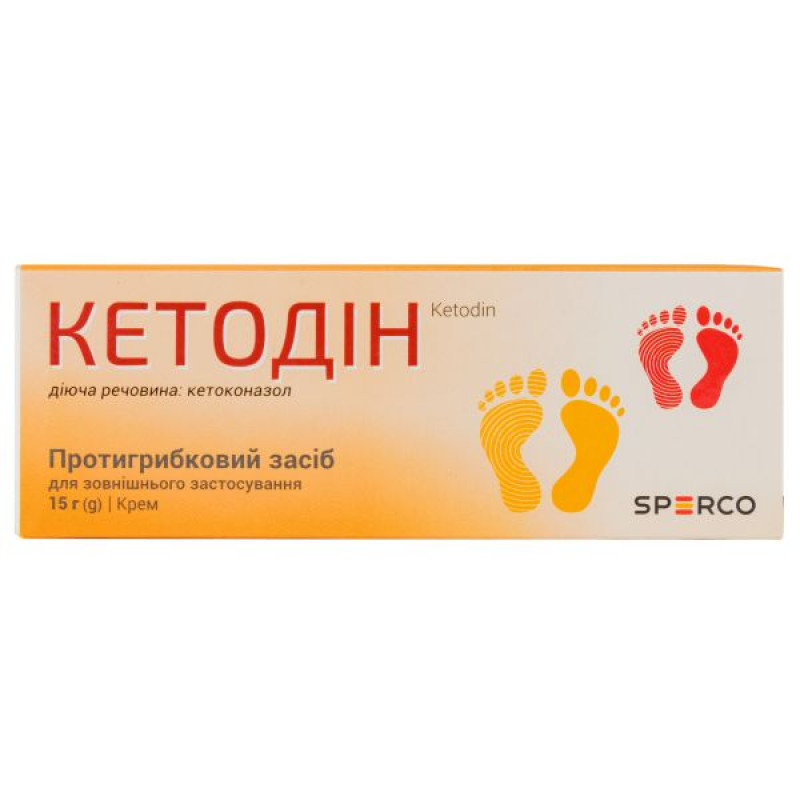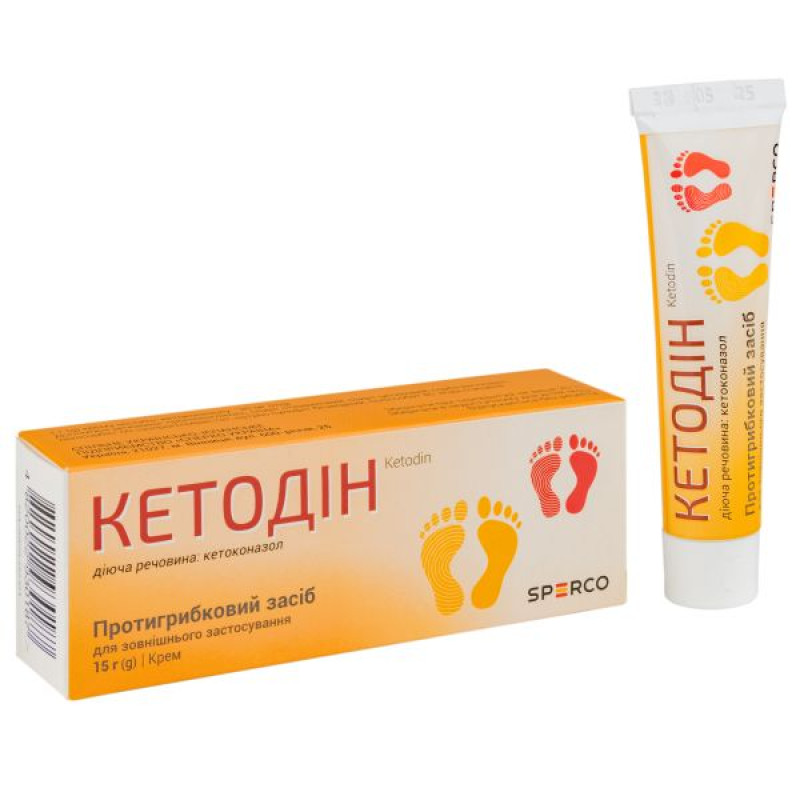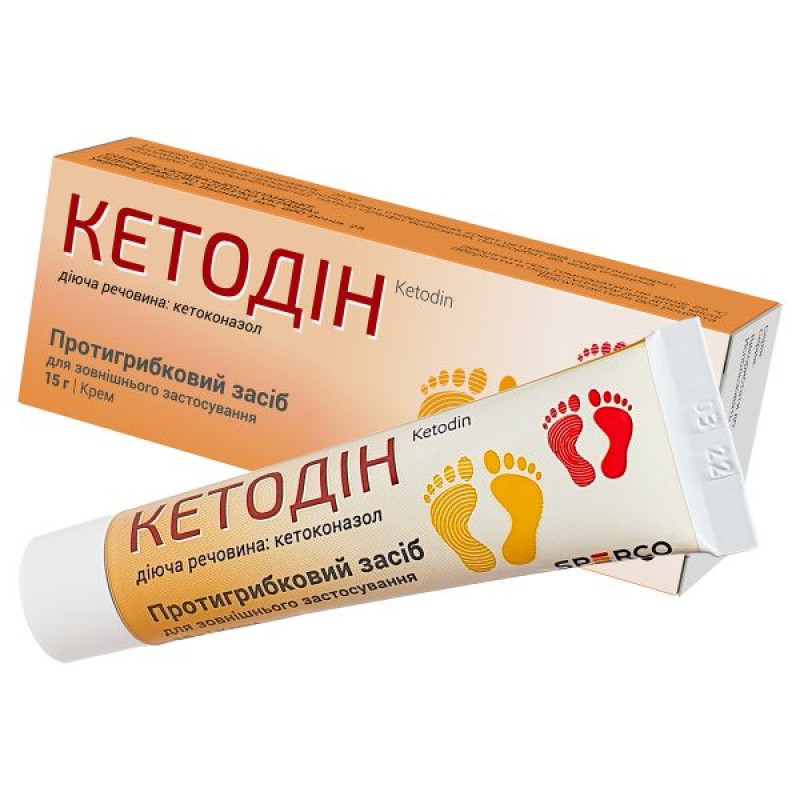Ketodin cream 20 mg/g tube of 15 g

Instructions Ketodin cream 20 mg/g tube 15 g
Composition
active ingredient: ketoconazole;
1 g of cream contains ketoconazole 20 mg;
excipients: propylene glycol, stearyl alcohol, cetyl alcohol, sorbitan stearate, polysorbate 60, isopropyl myristate, sodium sulfite anhydrous, polysorbate 80, purified water
Dosage form
Cream.
Main physicochemical properties: white cream, homogeneous consistency, odorless.
Pharmacotherapeutic group
Antifungal drugs for topical use. Imidazole and triazole derivatives.
ATX code D01A C08.
Pharmacological properties
Pharmacodynamics.
Ketoconazole is a synthetic imidazoledioxolane derivative that exhibits antifungal activity against dermatophytes Trichophyton spp., Epidermophyton floccosum and Microsporum spp., as well as yeasts, including Malassezia spp. and Candida spp. The effect is particularly pronounced against Malassezia spp.
Ketoconazole inhibits ergosterol biosynthesis in fungi and changes the composition of other lipid components in the membrane.
Ketoconazole cream provides rapid relief of itching, which is commonly associated with dermatophyte and yeast infections, as well as skin conditions caused by Malassezia spp. Symptomatic improvement is observed before the first signs of recovery appear.
Pharmacokinetics.
After topical application of the original ketoconazole cream, its content in the blood of adults was not detectable. In one study, approximately 40 g of the original ketoconazole 2% cream was applied daily to 40% of the body surface area of infants with seborrheic dermatitis: ketoconazole was detected in the plasma of 5 infants, with concentrations ranging from 32 to 133 ng/mL.
Indication
For topical use in the treatment of skin infections caused by dermatophytes: athlete's foot, athlete's foot, athlete's foot caused by Trichophyton rubrum, Trichophyton mentagrophytes, Microsporum canis and Epidermophyton floccosum, as well as for the treatment of cutaneous candidiasis and tinea versicolor.
Ketodine should also be prescribed for the treatment of seborrheic dermatitis, a skin condition associated with the presence of Malassezia furfur.
Contraindication
Hypersensitivity to ketoconazole and/or other components of the drug.
Interaction with other medicinal products and other types of interactions
No interactions with other drugs have been identified.
Application features
To prevent withdrawal syndrome after discontinuing long-term use of topical corticosteroids, it is recommended to continue applying topical corticosteroids to the affected area in the morning and Ketodine in the evening, and then gradually discontinue corticosteroid therapy over 2-3 weeks.
Ketodin, cream, should not be used in ophthalmological practice.
Propylene glycol may cause skin irritation. Cetyl alcohol and stearyl alcohol may cause local skin reactions (e.g. contact dermatitis).
Use during pregnancy or breastfeeding
There are no adequate and well-controlled studies of ketoconazole in pregnant or breastfeeding women. The risks associated with the use of the drug during pregnancy and breastfeeding are unknown.
Ability to influence reaction speed when driving vehicles or other mechanisms
Does not affect.
Method of administration and doses
Skin candidiasis, athlete's foot, athlete's foot inguinal and lichen planus: it is recommended to apply Ketodin to the affected skin and surrounding areas once a day.
Seborrheic dermatitis: it is recommended to apply Ketodine to the affected skin 1 or 2 times a day, depending on the severity of the infection.
Treatment should be continued for a sufficient period of time, at least for several days after all symptoms have disappeared. If symptoms persist after 4 weeks of treatment, the diagnosis should be reconsidered. General hygiene measures should be followed to control sources of infection and reinfection.
The usual duration of treatment is: tinea versicolor – 2-3 weeks, yeast infections – 2-3 weeks, inguinal epidermophytosis – 2-4 weeks, epidermophytosis of the body – 3-4 weeks, epidermophytosis of the feet – 4-6 weeks.
Typically, the duration of treatment for seborrheic dermatitis lasts 2-4 weeks. For maintenance therapy for seborrheic dermatitis, apply the cream 1 or 2 times a week.
Children.
There is no experience with the use of Ketodin cream in children.
Overdose
Local application.
In case of accidental application of a large amount of cream to the skin, erythema, edema, and a burning sensation of the skin may occur, which quickly disappear after discontinuation of therapy.
Accidental internal use.
In case of accidental ingestion, supportive and symptomatic therapeutic measures should be taken.
Side effects
During safety studies of the original ketoconazole cream, the following adverse reactions were observed in ≥ 1% of patients:
General disorders and administration site conditions: erythema, pruritus.
Skin and subcutaneous tissue disorders: burning sensation.
General disorders and administration site conditions: bleeding, discomfort, dryness, inflammation, irritation, paresthesia, application site reactions.
Immune system disorders: hypersensitivity reactions.
Skin and subcutaneous tissue disorders: bullous eruptions, contact dermatitis, peeling or stickiness of the skin.
The following adverse reactions have been identified during post-marketing surveillance of the original ketoconazole cream.
Skin and subcutaneous tissue disorders: very rare (<1/10,000, including isolated reports) - rash, urticaria.
Expiration date
2 years. Do not use after the expiry date stated on the packaging.
Storage conditions
Store at a temperature not exceeding 25 ° C. Keep out of the reach of children.
Packaging
15 g in an aluminum tube with a membrane and a lid in a cardboard box.
Vacation category
Without a prescription.
Producer
Joint Ukrainian-Spanish enterprise "Sperco Ukraine".
Address
21027, Ukraine, Vinnytsia, 600-anniversary St., 25.
Phone: + 38(0432)52-30-36. E-mail: trade@sperco.com.ua
www.sperco.com.ua
There are no reviews for this product.
There are no reviews for this product, be the first to leave your review.
No questions about this product, be the first and ask your question.










